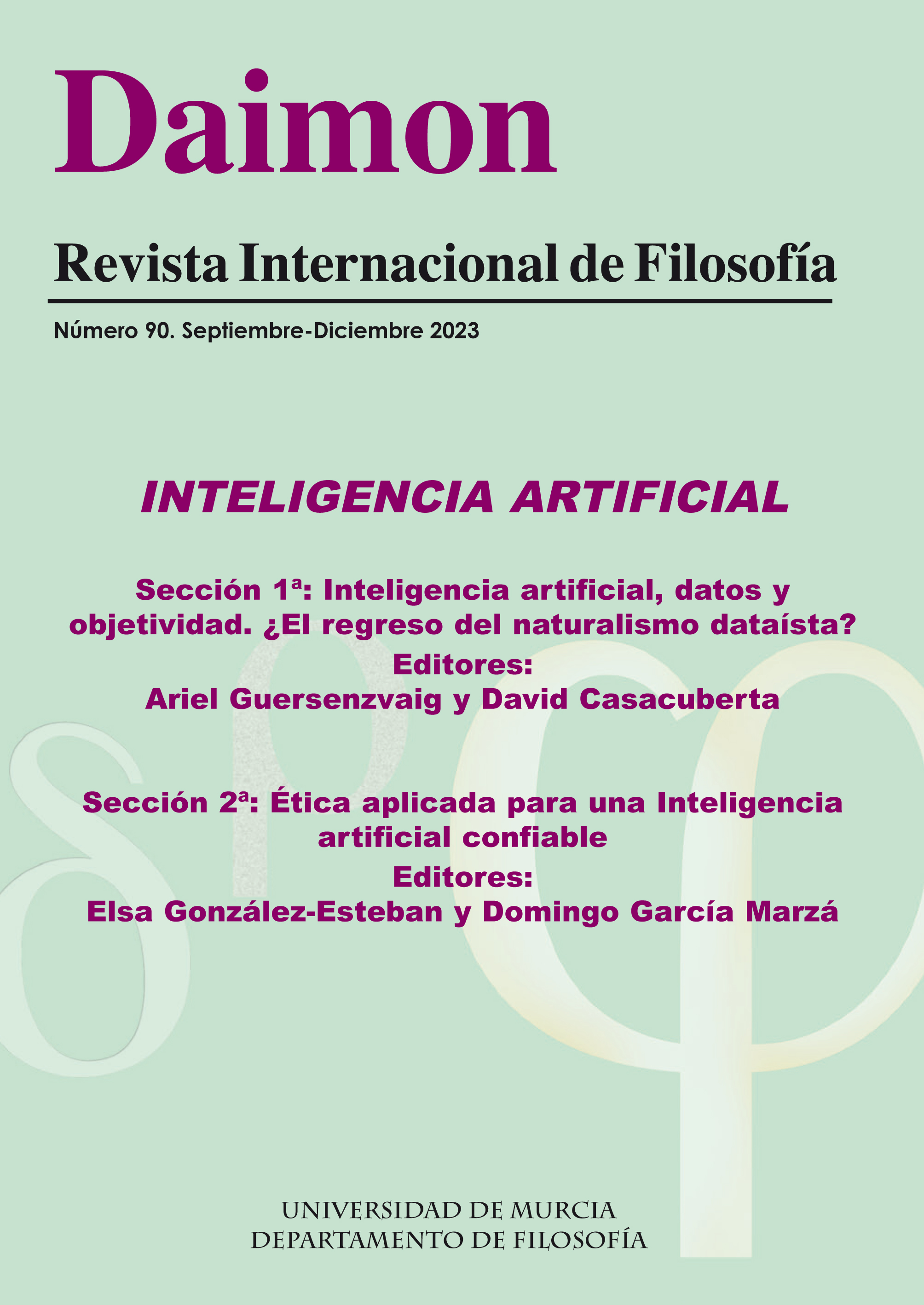Are computers intelligent agents capable of knowledge?
Abstract
The purpose of this paper is to study the philosophical basis of the architecture of two Artificial Intelligence systems (AlphaGo and Hide and Seek). The problem considers the elucidation of the epistemological distinction between “knowledge” and “intuition” and questions whether the fulfillment of a programmed metric can be considered as a product of knowledge or, as an example of intuitive thinking. Through the analysis of both examples, it is shown that achieving the desired objective (winning a game of Go and developing new hiding strategies) is not derived from the system’s architecture, but from the AI’s creativity to achieve the desired result; in that sense, it can be confirmed that certain intelligent systems are capable of creative and intuitive thinking.
Downloads
-
Abstract757
-
PDF (Español (España))526
-
HTML (Español (España))156
References
AlphaGo: Disponible en: https://deepmind.com/research/case-studies/alphago-the-story-so-far (última consulta el 18 de agosto de 2021).
Audi, Robert, “Intuition”, The Cambridge Dictionary of Philosophy. Tercera Edición. Cambridge: Cambridge University Press, 2019.
Baker, Bowen; Kanitscheider, Ingmar; Markov, Todor; Wu, Yi; Powell, Glenn; McGrew, Bob; Mordatch, Igor. “Emergent tool Use from Multi-Agent Autocurricula”, The International Conference on Learning Representations (conference paper), 2020, pp. 1-28. Disponible en: https://arxiv.org/pdf/1909.07528.pdf
Brunner, Florian. “Mastering the game of Go with deep neural networks and tree search”, Artificial Intelligence for Games Seminar Report, Heidelberg University, 2019, pp. 1-15.
https://hci.iwr.uni-heidelberg.de/system/files/private/downloads/36349047/report_florian_brunner.pdf
Cassirer, Ernst. “Zur ‘Philosophie der Mythologie’, en: Festschrift für Paul Natorp zum siebzigstigen Geburststage von Schüler und Freunden, Berlin/Leipzig: Walter de Gruyter, 1924.
Cassirer, Ernst. Filosofía de las formas simbólicas. El lenguaje. Traducción de Armando Morones. México: Fondo de Cultura Económica, 1998 [Philosophie der Symbolischen Formen. Die Sprache. Hamburg: Meiner, 2005].
Cassirer, Ernst. Filosofía de las formas simbólicas. El pensamiento mítico. Traducción de Armando Morones. México: Fondo de Cultura Económica, 1998 [Philosophie der Symbolischen Formen. Das Mythischen Denken. Hamburg: Meiner, 2005].
Cassirer, Ernst. Filosofía de las formas simbólicas. Fenomenología del conocimiento. Traducción de Armando Morones. México: Fondo de Cultura Económica, 1998 Philosophie der Symbolischen Formen. Phänomenologie der Erkenntnis. Hamburg: Meiner, 2005].
Gibney, Elizabeth. “Google masters Go. Deep Learning software excels at complex ancient board game”. Nature. Vol. 529 (2016), pp. 445–446.
https://www.nature.com/articles/529445a.pdf
Gibney, Elizabeth. “Google masters Go. Deep Learning software excels at complex ancient board game”. Nature. Vol. 529 (2016), pp. 445–446.
Granter, Scott; Beck, Andrew; Papke Jr., David. “Alpha Go, Deep Learning, and the Future of the Human Micropist”, Arch Pathol. Lab Med, Vol. 141, No. 5 (2017), pp. 619-61.
https://doi.org/10.5858/arpa.2016-0471-ED
Ibarra, Andoni; Mormann, Thomas, “Una teoría combinatoria de las representaciones científicas”, Crítica. Revista Hispanoamericana de Filosofía, Vol. 32, No. 95, 2000, pp. 3-46.
Mccarthy, John; Minsky Marvin; Rochester, Nathaniel; Shannon, Claude. A proposal for the Darmouth Summer Research Project on Artificial Intelligence, 1955.
http://jmc.stanford.edu/articles/dartmouth/dartmouth.pdf
Miranda-Rojas, Rafael. “Intuición, racionalidad y confiabilidad”, Cinta Moebio, (2018), Vol. 62, pp. 261-273.
http://dx.doi.org/10.4067/S0717-554X2018000200261
OpenAI, Emergent Tool from Multi-Agent Interaction, (2019). Disponible Online: https://openai.com/blog/emergent-tool-use/
Platón, Teeteto, 201d. Diálogos, Traducción y notas de Ma. Santa Cruz; A. Vallejo Campos; N. Luis Cordero, Madrid: Gredos, 2015.
Scott Granter, Andrew Beck y David Papke Jr., “Alpha Go, Deep Learning, and the Future of the Human Micropist”, Arch Pathol. Lab Med, Vol. 141, No. 5 (2017), pp. 619-61.
Silver, D., Schrittwieser, J., Simonyan, K. et al. “Mastering the game of Go without human knowledge”, Nature, Vol. 550, (2017), pp. 354–359.
https://doi.org/10.1038/nature24270
Silver, D.; Schrittwieser, J.; Simonyan, K., et al. “Mastering the game of Go without human knowledge”. Nature, Vol. 550, (2017), pp. 354–359.
Copyright (c) 2023 Daimon Revista Internacional de Filosofia

This work is licensed under a Creative Commons Attribution-NonCommercial-NoDerivatives 3.0 Unported License.
Las obras que se publican en esta revista están sujetas a los siguientes términos:
1. El Servicio de Publicaciones de la Universidad de Murcia (la editorial) conserva los derechos patrimoniales (copyright) de las obras publicadas, y favorece y permite la reutilización de las mismas bajo la licencia de uso indicada en el punto 2.
2. Las obras se publican en la edición electrónica de la revista bajo una licencia Creative Commons Reconocimiento-NoComercial-SinObraDerivada 3.0 España (texto legal). Se pueden copiar, usar, difundir, transmitir y exponer públicamente, siempre que: i) se cite la autoría y la fuente original de su publicación (revista, editorial y URL de la obra); ii) no se usen para fines comerciales; iii) si remezcla, transforma o crea a partir del material, no podrá distribuir el material modificado.
3. Condiciones de auto-archivo. Se permite y se anima a los autores a difundir electrónicamente las versiones pre-print (versión antes de ser evaluada) y/o post-print (versión evaluada y aceptada para su publicación) de sus obras antes de su publicación, ya que favorece su circulación y difusión más temprana y con ello un posible aumento en su citación y alcance entre la comunidad académica. Color RoMEO: verde.











